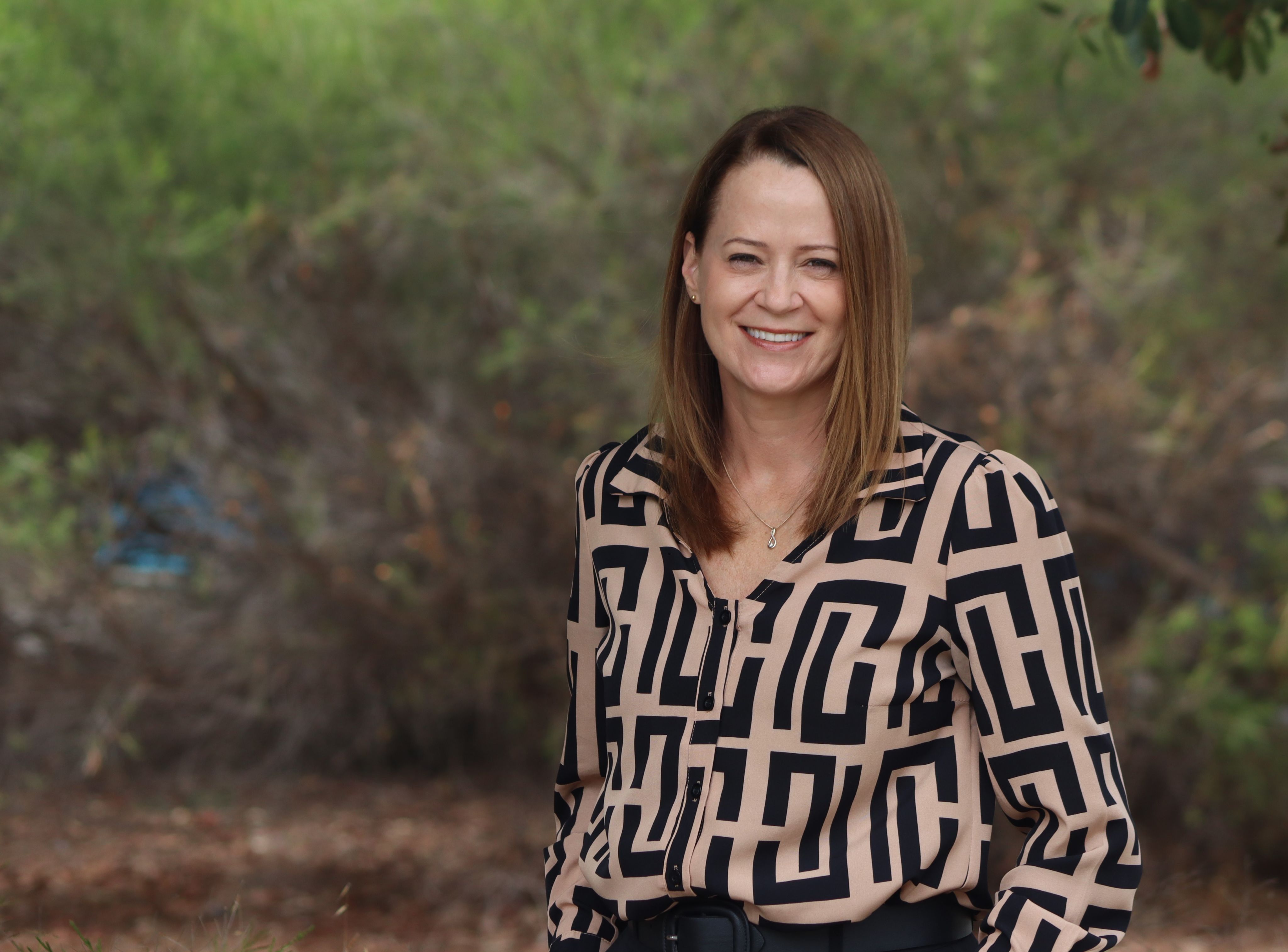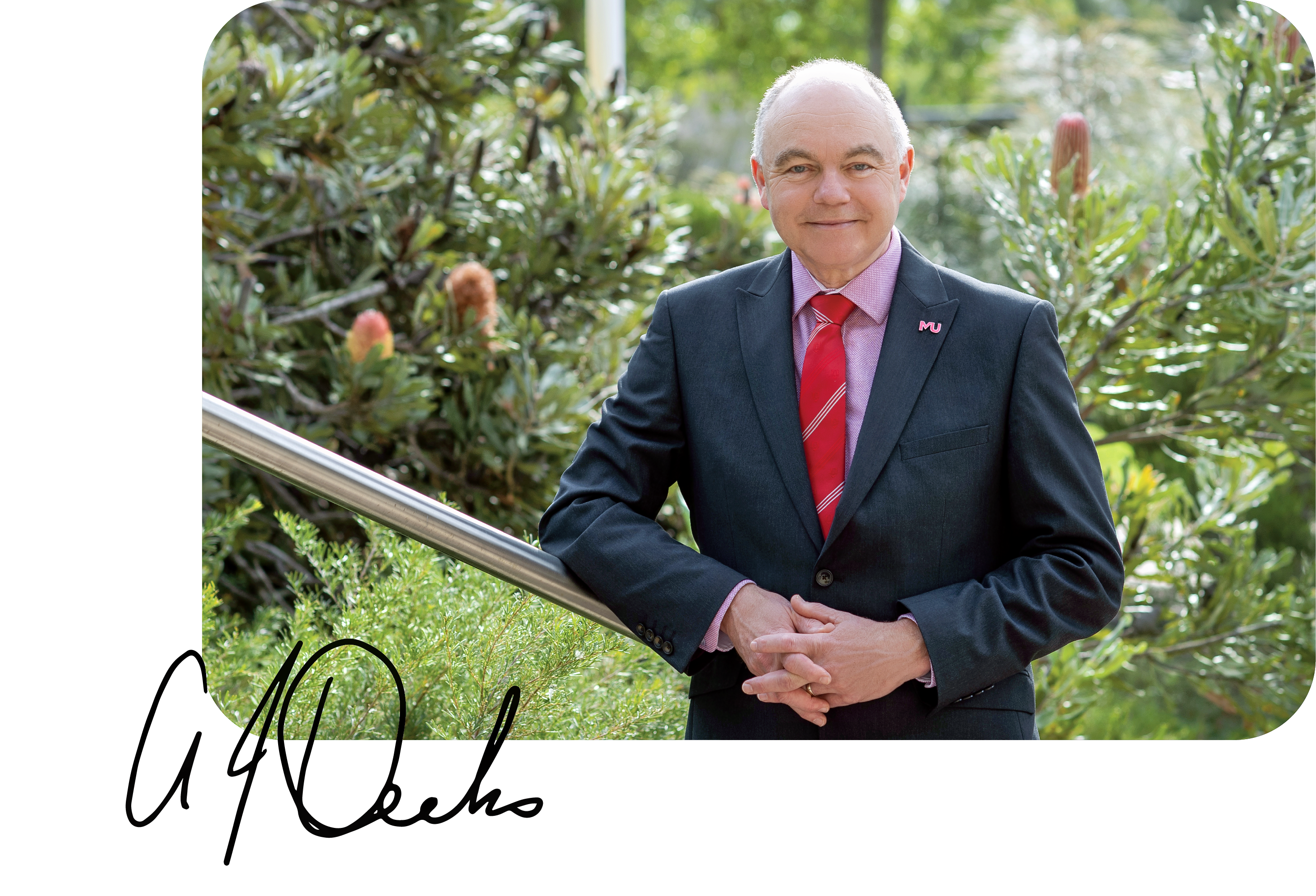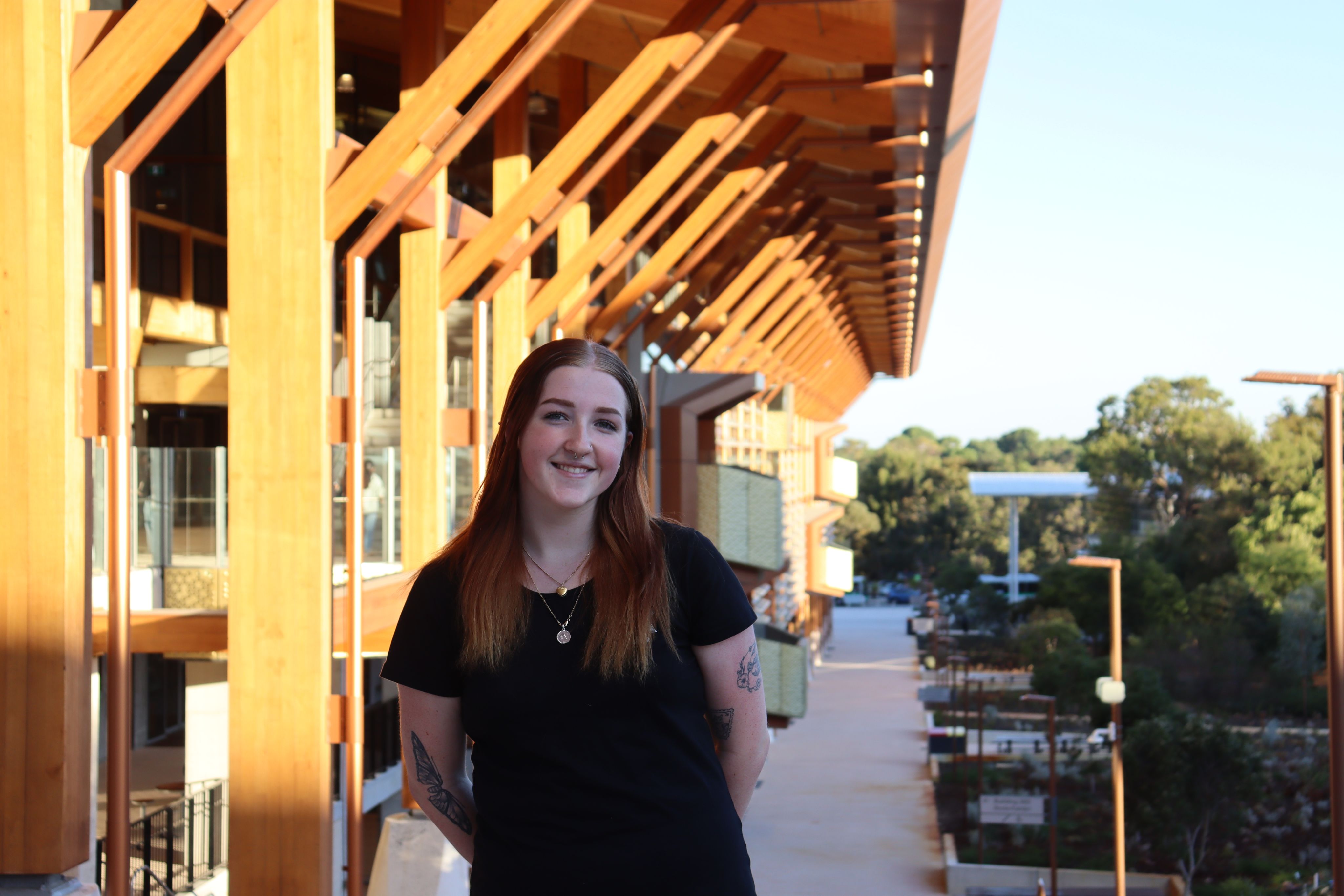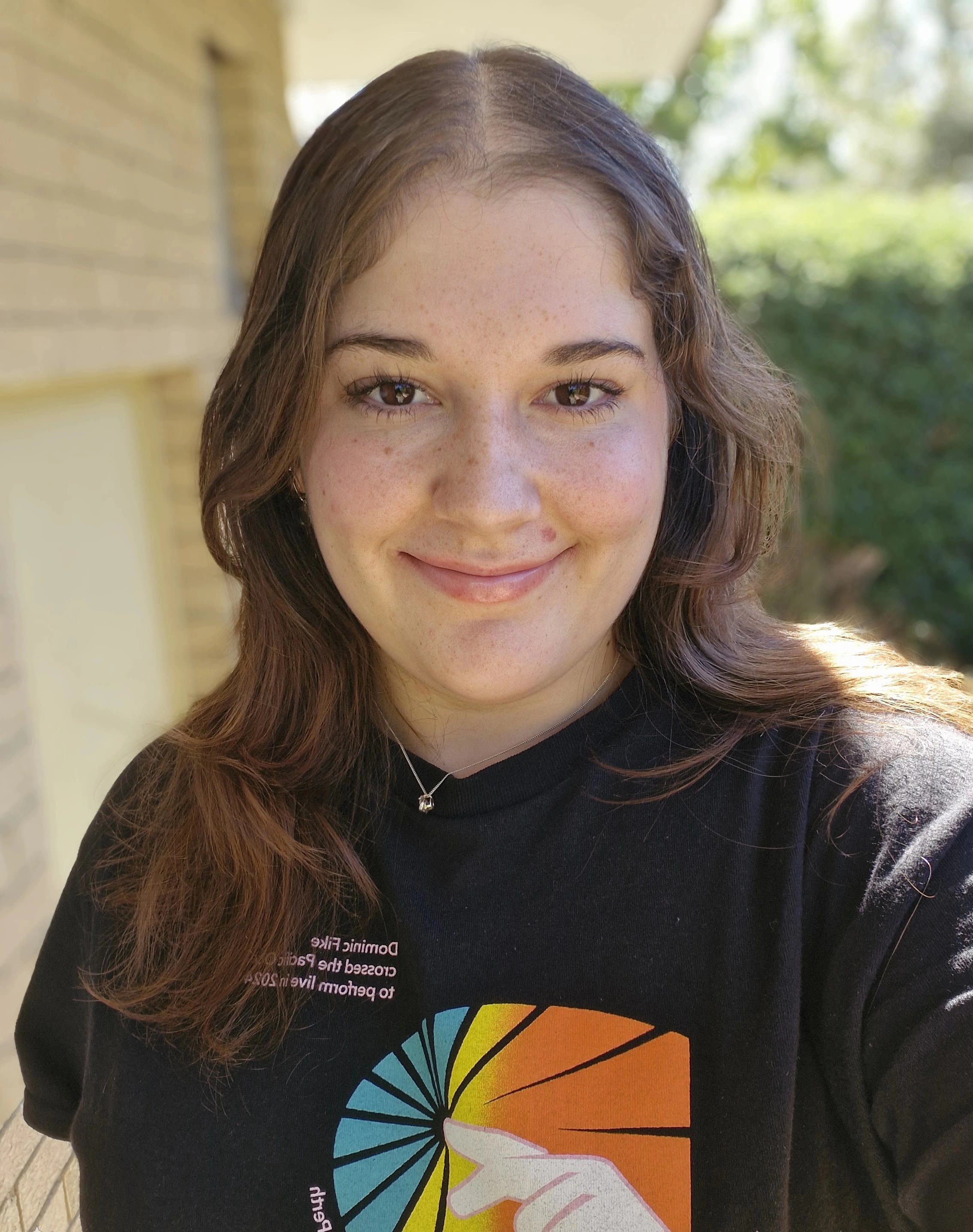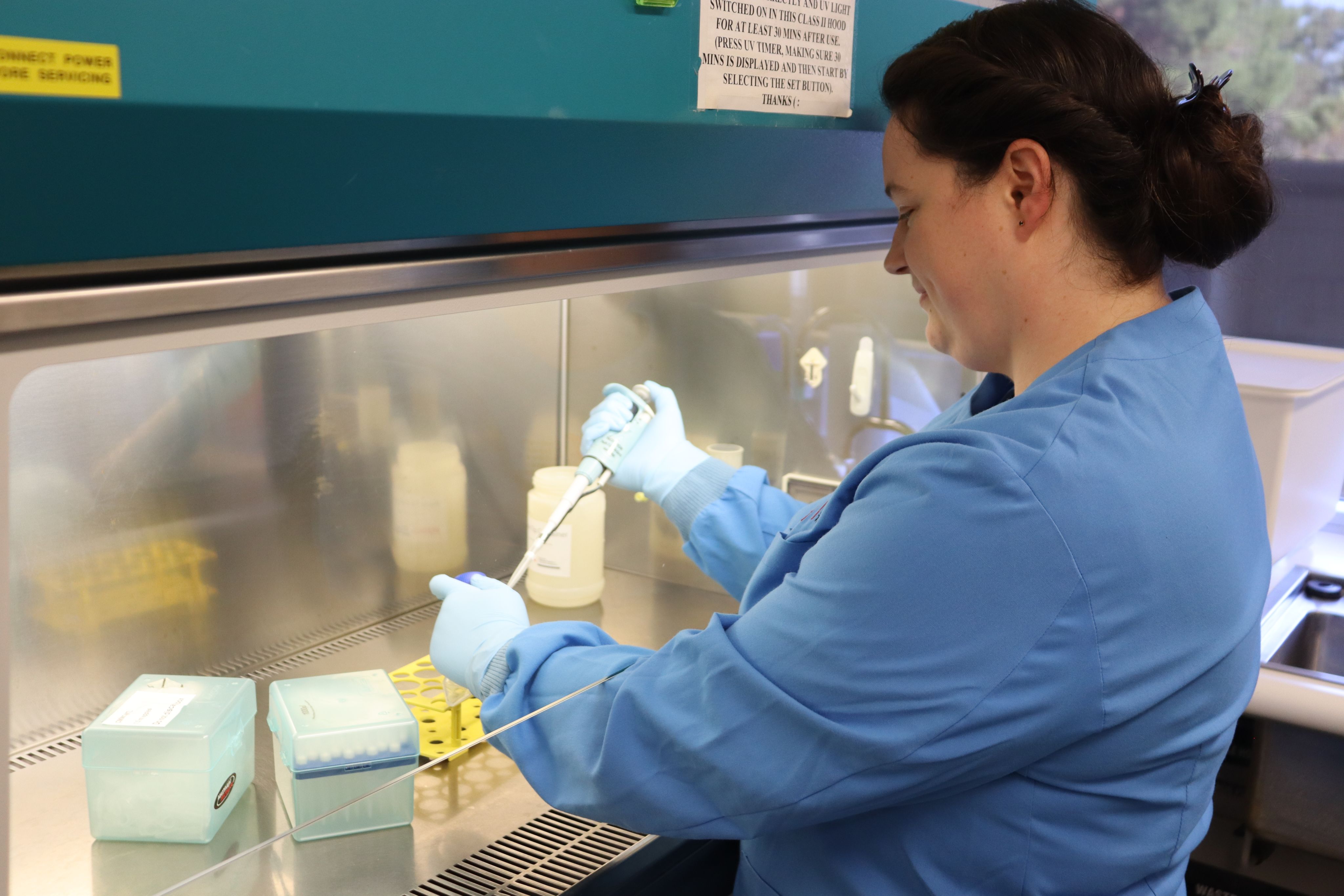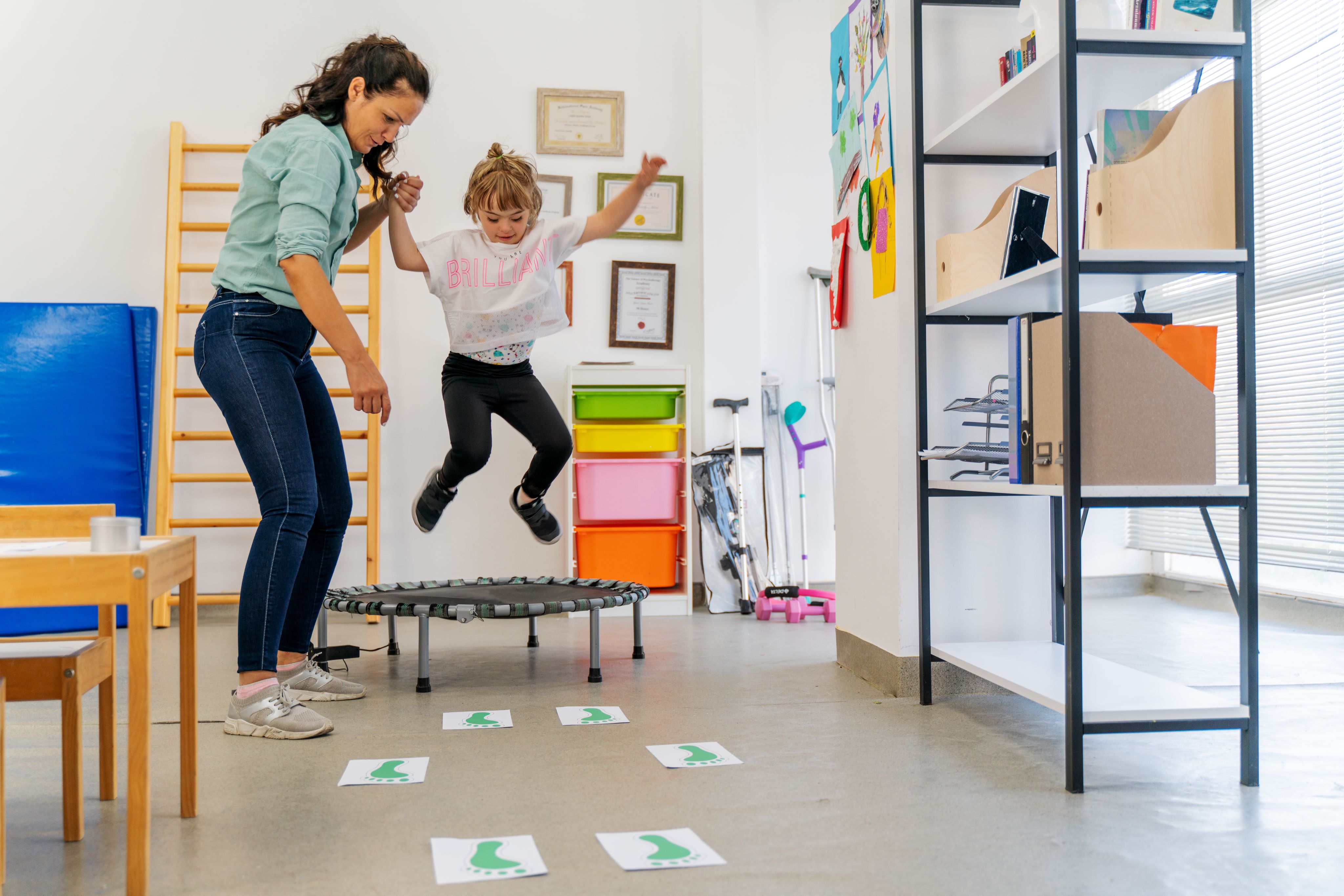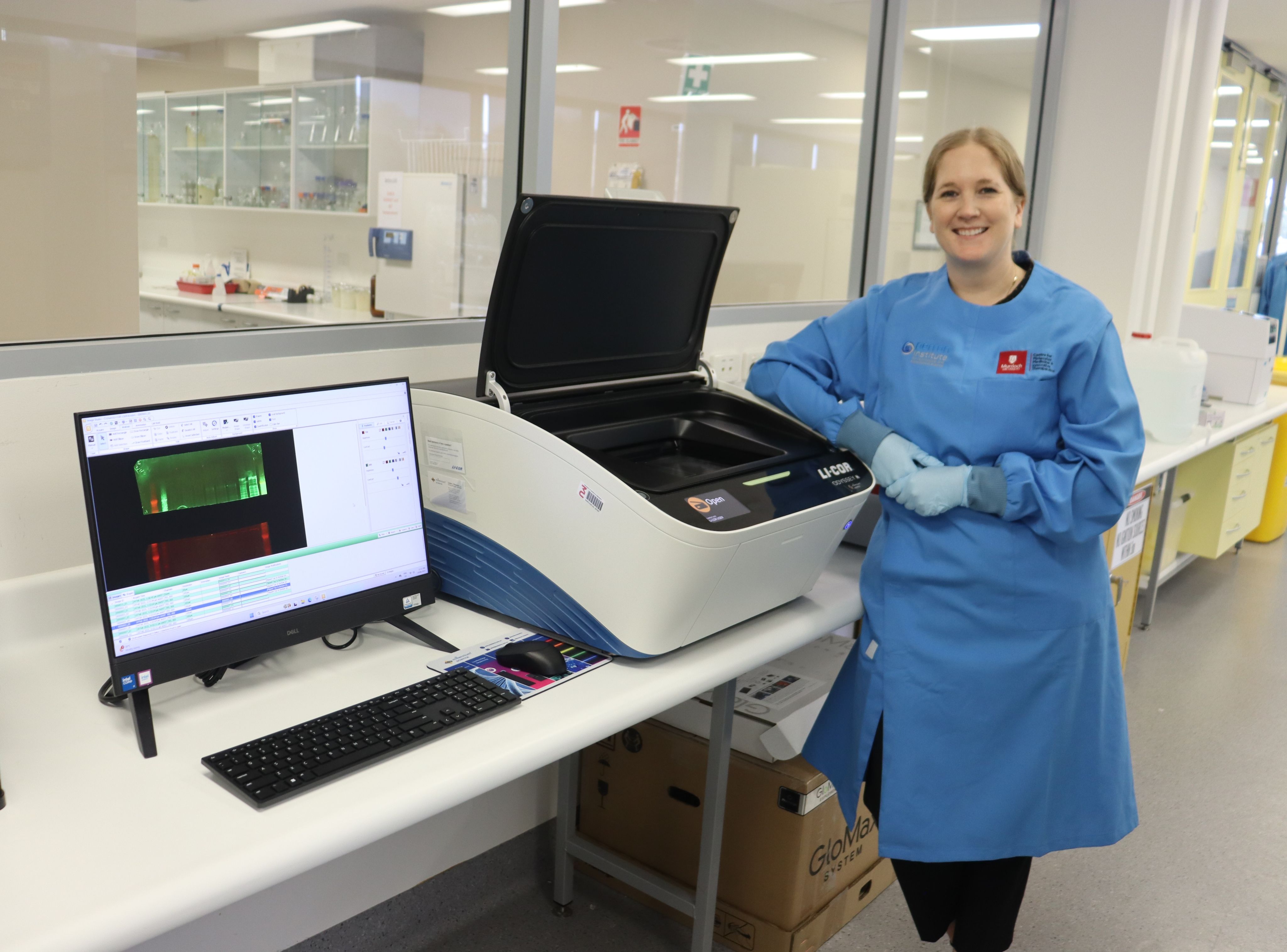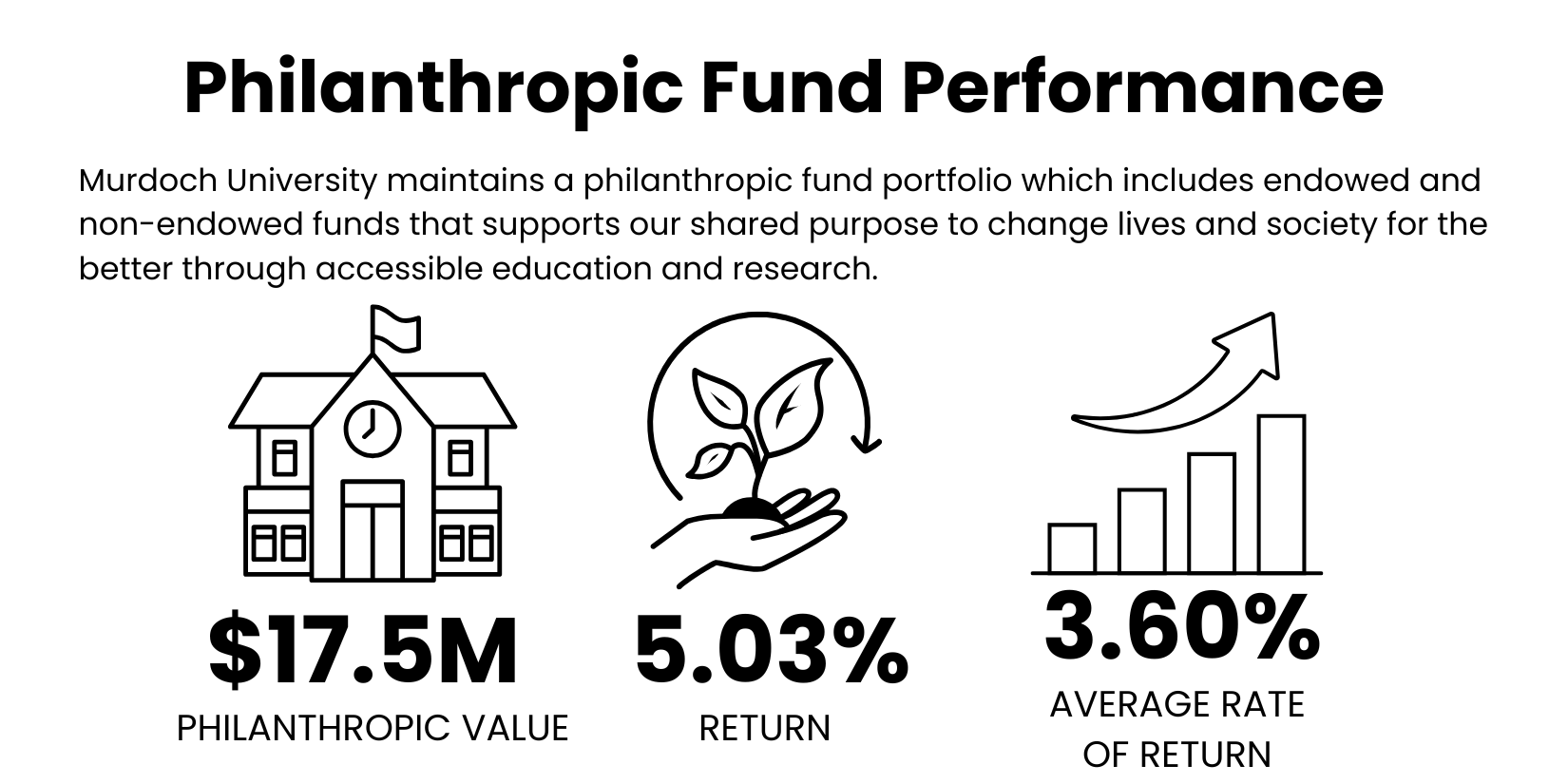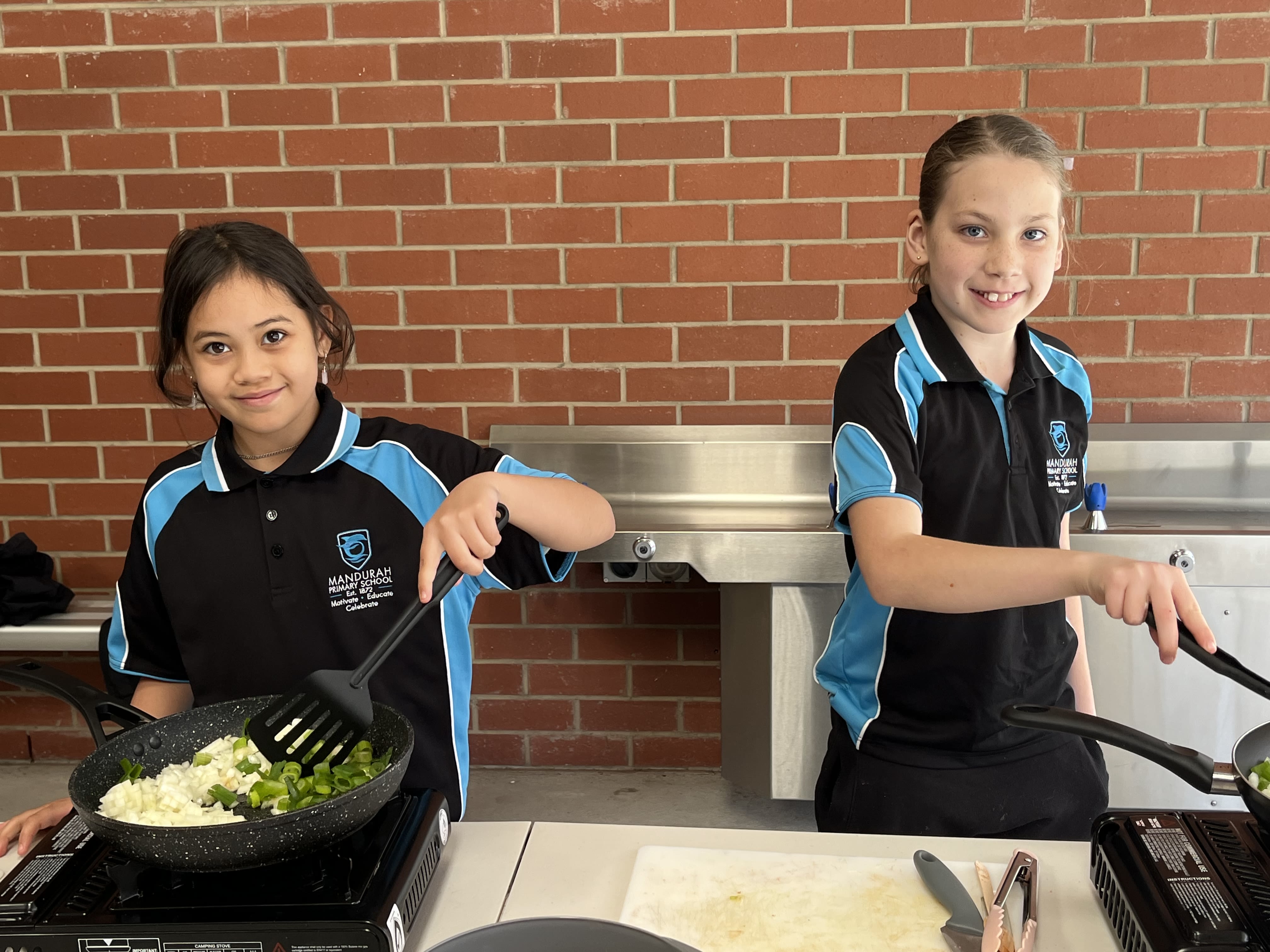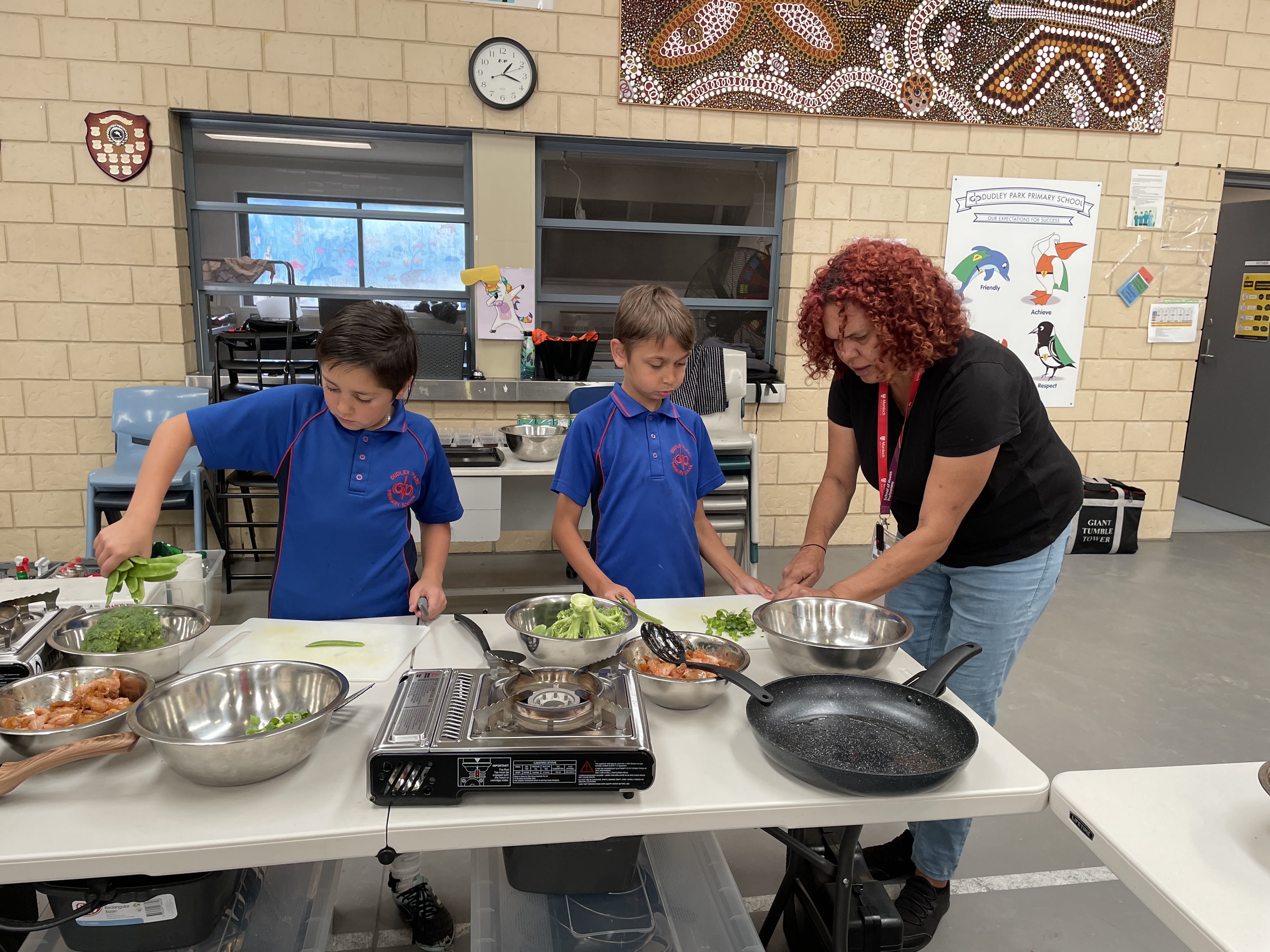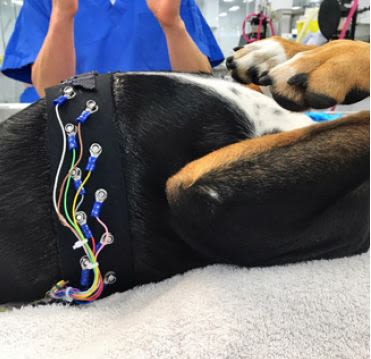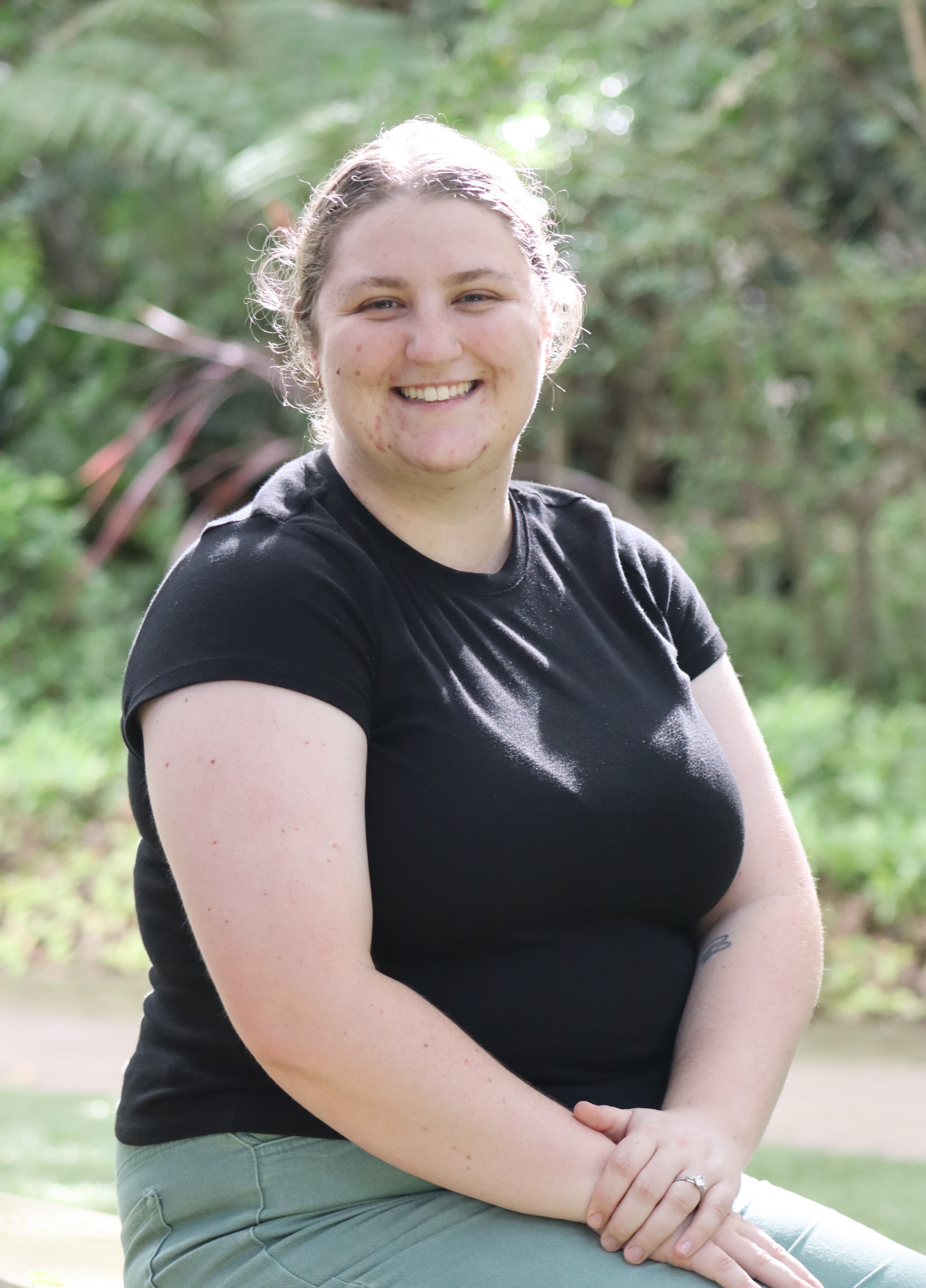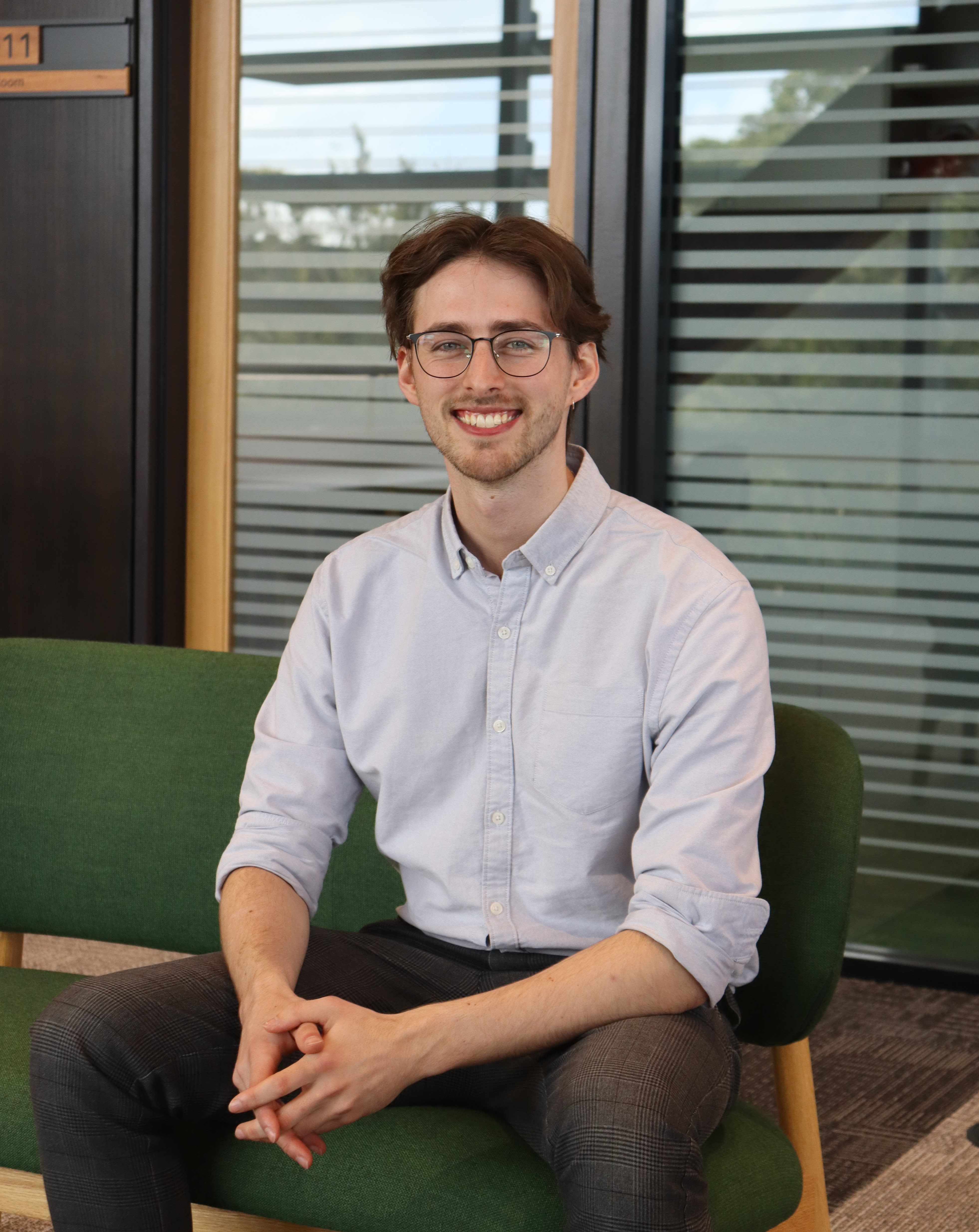Donor Impact Report

Professor Andrew J Deeks
On behalf of Murdoch University, we want to extend our heartfelt thanks for your incredible generosity and support in 2024.
Your contributions continue to make a profound impact -helping us open doors for students who may have thought university was beyond their reach and driving forward the pioneering research needed to address some of the world's most pressing challenges. Every gift, no matter the size, creates lasting change.
As you explore our 2024 Donor Impact Report, we hope it provides meaningful insight into how your generosity is shaping both individual lives and our university community. With your support, we are creating a brighter future, and I am deeply grateful for your commitment and investment in Murdoch University.
"Murdoch remains
deeply committed
to supporting First
Nations communities"
Our dedication to providing life-changing scholarships remains stronger than ever. With a broad range of opportunities addressing equity, diversity, merit, and geographical criteria, we continue to expand scholarships for both domestic and international students. This support ensures that an increasing number of students can access higher education and experience its transformative effects.
Together, we have also helped advance pioneering research that is tackling some of the most critical social, health, and sustainability challenges - both locally and globally. This work will have lasting benefits, now and for generations to come.
Murdoch remains deeply committed to supporting First Nations communities, with ongoing investments in research and programs aimed at improving health and wellbeing outcomes for First Nations people and their families.
As we move forward, we continue to build on our proud history of expanding access to higher education. Following the success of our 50 scholarships for 50 years initiative, we remain dedicated to increasing opportunities for students from rural and remote areas, ensuring they too can thrive at university.
Once again, thank you for your generosity and belief in our mission. It is a privilege to partner with you as we work towards a more inclusive, innovative, and sustainable world through education and research.
We look forward to what we will achieve together in 2025 during our 50th year.
Professor Andrew J Deeks
Vice Chancellor and President
Professor Andrew J Deeks
On behalf of Murdoch University, we want to extend my heartfelt thanks for your incredible generosity and support in 2024.
Your contributions continue to make a profound impact -helping us open doors for students who may have thought university was beyond their reach and driving forward the pioneering research needed to address some of the world's most pressing challenges. Every gift, no matter the size, creates lasting change.
As you explore our 2024 Donor Impact Report, we hope it provides meaningful insight into how your generosity is shaping both individual lives and our university community. With your support, we are creating a brighter future, and I am deeply grateful for your commitment and investment in Murdoch University.
"Murdoch remains
deeply committed
to supporting First
Nations communities"
Our dedication to providing life-changing scholarships remains stronger than ever. With a broad range of opportunities addressing equity, diversity, merit, and geographical criteria, we continue to expand scholarships for both domestic and international students. This support ensures that an increasing number of students can access higher education and experience its transformative effects.
Together, we have also helped advance pioneering research that is tackling some of the most critical social, health, and sustainability challenges - both locally and globally. This work will have lasting benefits, now and for generations to come.
Murdoch remains deeply committed to supporting First Nations communities, with ongoing investments in research and programs aimed at improving health and wellbeing outcomes for First Nations people and their families.
As we move forward, we continue to build on our proud history of expanding access to higher education. Following the success of our 50 scholarships for 50 years initiative, we remain dedicated to increasing opportunities for students from rural and remote areas, ensuring they too can thrive at university.
Once again, thank you for your generosity and belief in our mission. It is a privilege to partner with you as we work towards a more inclusive, innovative, and sustainable world through education and research.
We look forward to what we will achieve together in 2025 during our 50th year.
Professor Andrew J Deeks
Vice Chancellor and President
for regional and
remote students.
The 50 scholarships in celebration of our 50 years initiative continues its pursuit to raise at least $250,000 for undergraduate students (including First Nations students) living in regional or remote areas who may be experiencing financial hardship.
We are delighted to say that the initiative is already over halfway to its target with generous philanthropic support now totalling more than $180,000.
This outstanding result has enabled Murdoch to award the scholarships to the first recipients such as Amber Wilkinson from Albany. Amber is studying a Bachelor of Communication and Creative Media, and the scholarship has made a dramatic difference to her life and ability to pursue her higher education dreams.
"Now I won't have to walk to university every day to do homework."
“Being awarded this scholarship has honestly seen such a weight lifted off my shoulders. I have been struggling with money since moving up to Perth and only recently acquired a job. This has come at the perfect time because I am able to put this money towards a more powerful computer while being financially stable. Now I won’t have to walk to university every day to do homework!”
Amber Wilkinson
Amber Wilkinson
The 50 scholarships in celebration of our 50 years initiative continues its pursuit to raise at least $250,000 for undergraduate students (including First Nations students) living in regional or remote areas who may be experiencing financial hardship.
We are delighted to say that the initiative is already over halfway to its target with generous philanthropic support now totalling more than $180,000.
This outstanding result has enabled Murdoch to award the scholarships to the first recipients such as Amber Wilkinson from Albany. Amber is studying a Bachelor of Communication and Creative Media, and the scholarship has made a dramatic difference to her life and ability to pursue her higher education dreams.
"Now I won't have to walk to university every day to do homework."
“Being awarded this scholarship has honestly seen such a weight lifted off my shoulders. I have been struggling with money since moving up to Perth and only recently acquired a job. This has come at the perfect time because I am able to put this money towards a more powerful computer while being financially stable. Now I won’t have to walk to university every day to do homework!”
Amber Wilkinson
Amber Wilkinson
Dannon Hambley
Dannon Hambley
For Dannon Hambley, completing a Bachelor of Criminology & Psychology, the scholarship has enabled her to prioritise study that is leading her directly towards her future career goals.
"Having this support has made me feel seen and encouraged, and it’s helped me stay on track academically."
A sentiment echoed in a testimonial from the third recipient, Arli Vanderleer, who is completing her Bachelor of Business.
“The funds from this scholarship will allow me to put more of my time into studying, rather than having to survive off full time work whilst also at university full time. After moving from a regional town to Perth, I have gone through many changes, and this scholarship has made it much easier to settle down.”
Dannon Hambley
Dannon Hambley
For Dannon Hambley, completing a Bachelor of Criminology & Psychology, the scholarship has enabled her to prioritise study that is leading her directly towards her future career goals.
"Having this support has made me feel seen and encouraged, and it’s helped me stay on track academically."
A sentiment echoed in a testimonial from the third recipient, Arli Vanderleer, who is completing her Bachelor of Business.
“The funds from this scholarship will allow me to put more of my time into studying, rather than having to survive off full time work whilst also at university full time. After moving from a regional town to Perth, I have gone through many changes, and this scholarship has made it much easier to settle down.”
'I strongly believe that talent is distributed uniformly, but opportunities are not.”
The life changing impact of these scholarships has been made possible by a range of generous donors seeking to open the doors of higher education to those who have often missed out previously.
One such donor is Professor Robyn Owens, who understands the difference the scholarships can make for both individuals and their communities.
“I strongly believe that talent is distributed uniformly, but opportunities are not. By providing scholarships for rural and remote students, Murdoch University is not only able to help talented individuals reach their full potential but also help them to contribute to the history and lives of the communities they come from,” she said.
precision medicine
to combat adverse
drug reactions.
Thanks to The Ian Potter Foundation, Murdoch’s Personalised Medical Centre (PMC) has secured new equipment to enhance their specialist genomics suite.
Established in 2019, PMC is evolving into a multi-disciplinary research centre striving to address some of the big issues in healthcare. Their researchers believe precision medicine has the potential to transform healthcare globally.
The donation has enabled PMC to purchase a Chromium iX and a Visium Cytassist.
The Genomics Chromium iX is a laboratory instrument designed to analyse individual cells from various biological samples. It uses advanced microfluidics technology to separate thousands of single cells into tiny droplets, each containing unique barcodes. This process allows researchers to study gene expression and other cellular characteristics at a single-cell level.
The Visium CytAssist is a laboratory tool that helps scientists’ study how genes are active in different parts of a tissue sample. It works by transferring important molecules from regular glass slides (where tissue samples are prepared) onto special slides that allow for detailed gene analysis. This makes it easier to see how cells and genes behave in different areas of the tissue, even in preserved or frozen samples.
This infrastructure will be used immediately by the internationally leading drug hypersensitivity research group of Professor Elizabeth Phillips and Dr Andrew Gibson, to understand the skin restricted response occurring during severe cutaneous drug reactions.
“This new equipment will allow us to identify rare but important disease-driving populations in human tissues including those targeted during severe drug reactions. By understanding what these cells are, and where they reside in human tissues, we can define key cellular interactions critical to develop new therapeutic interventions and reduce mortality associated with life-threatening adverse drug reactions” said PMC Postdoctoral Research Fellow Andrew Gibson (shown left).
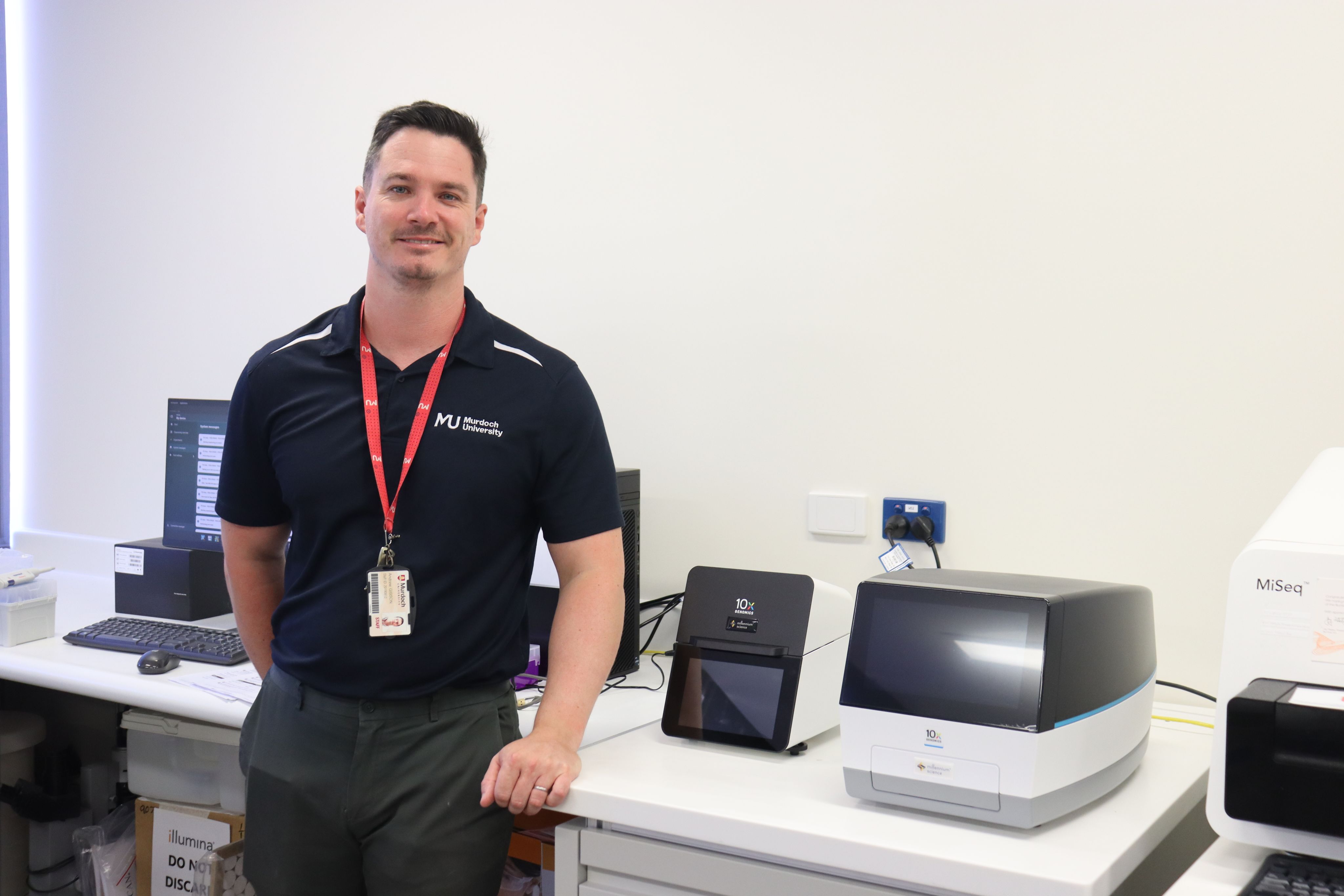
precision medicine
to combat adverse
drug reactions.
Thanks to The Ian Potter Foundation, Murdoch’s Personalised Medical Centre (PMC) has secured new equipment to enhance their specialist genomics suite.
Established in 2019, PMC is evolving into a multi-disciplinary research centre striving to address some of the big issues in healthcare. Their researchers believe precision medicine has the potential to transform healthcare globally.
The donation has enabled PMC to purchase a Chromium iX and a Visium Cytassist.
The Genomics Chromium iX is a laboratory instrument designed to analyse individual cells from various biological samples. It uses advanced microfluidics technology to separate thousands of single cells into tiny droplets, each containing unique barcodes. This process allows researchers to study gene expression and other cellular characteristics at a single-cell level.
The Visium CytAssist is a laboratory tool that helps scientists’ study how genes are active in different parts of a tissue sample. It works by transferring important molecules from regular glass slides (where tissue samples are prepared) onto special slides that allow for detailed gene analysis. This makes it easier to see how cells and genes behave in different areas of the tissue, even in preserved or frozen samples.
This infrastructure will be used immediately by the internationally leading drug hypersensitivity research group of Professor Elizabeth Phillips and Dr Andrew Gibson, to understand the skin restricted response occurring during severe cutaneous drug reactions.
“This new equipment will allow us to identify rare but important disease-driving populations in human tissues including those targeted during severe drug reactions. By understanding what these cells are, and where they reside in human tissues, we can define key cellular interactions critical to develop new therapeutic interventions and reduce mortality associated with life-threatening adverse drug reactions” said PMC Postdoctoral Research Fellow Andrew Gibson (shown left).

In 2024, Murdoch University was successful
in securing Channel 7 Telethon Trust grants for five
individual research programs.
Cochlear Ear Implants. Cochlear implants restore hearing in children with severe to profound deafness. However, outcomes can vary and are associated with the development of scar tissue around the electrode. This study investigates the changes that occur in the cochlea, following implantation, which can lead to fibrosis. There are currently no clinically approved treatments to limit fibrosis after implantation. The research will investigate changes that can occur within the cochlea post-implantation and will help limit inner ear fibrosis and improve longer term outcomes.
Mini Brain Models. Over 63,000 West Australian children live with a rare disease. One in four will pass before age five. Guided by consumers, Murdoch researchers are creating mini models of the human brain called organoids using cells from patients. Focusing on rare neurological disorders, the research team will establish a pipeline for generating 3D brain organoids. These models will increase understanding of disease mechanisms, help in the assessment of new treatments and feed into the drug development platform.
Accessible Physical Activity for Autistic Children. Physical activity (PA) is important for child health and function. However, meeting PA recommendations can be especially challenging for autistic children who are minimally verbal. A common barrier is the lack of autism awareness of individuals in the PA industry. This program aims to identify and address barriers to PA for these children and provide parents and allied health professionals tailored training and support. The proposal has two main aims: i) extend a previous, evidence-based PA program to engage minimally verbal autistic Western Australian children and their parents and ii) train community-based exercise professionals to facilitate the delivery of the program to minimally verbal autistic children.
Yawardani Jan-ga (‘Horses Helping’). Yawardani Jan-ga is an implementation-research project that supports ‘at risk’ Aboriginal youth. It supports the social, emotional, and spiritual wellbeing of young Aboriginals across Western Australia’s Kimberley region by delivering a culturally secure Equine Assisted Learning program. The program utilises the therapeutic power of the human-horse bond to address trauma, mental health, emotional challenges, and leadership, as well as all facets and challenges of a young Aboriginal person’s life. Strengths based, the program gives clients relational and regulation skills for life. Yawardani Jan-ga is led, developed, and implemented by Aboriginal community members on-country, in response to community concerns and requests for their young people.
LICORbio: Odyssey M and Liquid Handler. In another program researching rare diseases, a LICORbio Odyssey M Imaging System combined with an automatic liquid handler will streamline the precision drug development pipeline for children suffering from rare genetic conditions. This equipment will not only improve accuracy, reproducibility, and reduce researcher time, but will also accelerate the drug development timeline. The Odyssey Imaging System will provide reliable data informing the research team of the downstream effects of personalised drugs, enabling quicker identification of efficient drug candidates.
ℹ️ Five grant applications are the maximum an organisation can submit to Telethon at any one time and to be successful in all five is an outstanding achievement.
Performance
Murdoch University manages a philanthropic fund portfolio that encompasses both endowed and non-endowed funds aimed at fulfilling our shared purpose to change lives and society for the better through accessible education and research.
Endowed funds are structures to generate long-term impact through self-sustaining funding. The principal value of the gift is preserved, and a fixed percentage of the funds are distributed for use to deliver on Murdoch’s mission, in accordance with the intent of each donor.
The impact of Murdoch’s philanthropic funds will continue to make a difference by supporting students and advancing research. The generosity of gifts in perpetuity will ensure their impact will endure, benefiting current and future generations, and addressing societal and environmental challenges to create a better and brighter future.
As you explore our 2024 Donor Impact Report, I hope it provides meaningful insight into how your generosity is shaping both individual lives and our university community. With your support, we are creating a brighter future, and I am deeply grateful for your commitment and investment in Murdoch University.
A snapshot of your generosity
(All figures as at 31 December 2024)
Philanthropic Fund Performance
Murdoch University manages a philanthropic fund portfolio that encompasses both endowed and non-endowed funds aimed at fulfilling our shared purpose to change lives and society for the better through accessible education and research.
Endowed funds are structures to generate long-term impact through self-sustaining funding. The principal value of the gift is preserved, and a fixed percentage of the funds are distributed for use to deliver on Murdoch’s mission, in accordance with the intent of each donor.
The impact of Murdoch’s philanthropic funds will continue to make a difference by supporting students and advancing research. The generosity of gifts in perpetuity will ensure their impact will endure, benefiting current and future generations, and addressing societal and environmental challenges to create a better and brighter future.
A snapshot of your generosity
(All figures as at 31 December 2024)
generation through
nutrition literacy
In 1826, a French gastronome wrote in Physiologie du goût (The Physiology of Taste): "Dis-moi ce que tu manges, je te dirai ce que tu es." Translated, this reads Tell me what you eat, and I will tell you what you are.
Two centuries on, the world is still in agreement on the critical relationship between food and well-being. Recognising this pivotal link, Murdoch’s Ngangk Yira Institute for Change established an innovative cooking and nutrition program teaching young people essential skills and knowledge while incorporating bush tucker and community collaboration.
The Deadly Koolinga Chefs Program (DKCP) is a collaborative food literacy project between Ngangk Yira and the School of Nursing. Led by Associate Professor Caroline Nilson, the program implements cooking classes in schools in the Peel region of Western Australia. It has been made possible thanks to foundation partner Aryzta - a multi-national food company based in Switzerland famous for its baked goods and products, and with local support from Alcoa.
Implementing food literacy and nutrition programs into the education sector has been identified as being crucial to individual and community health and well-being for life. Participating students and their families gain appropriate knowledge, skills, attitudes and values to make choices that facilitate an overall healthy relationship with food.
The inclusion of DKCP into school programming has had significant benefits.
“It has enhanced cultural engagement, fostered important learning about nutrition and enabled students to develop practical skills in food preparation; all lessons that will serve them well throughout their lives”, said Jan Stone, Principal at Pinjarra Senior High School.
Shannon Wright, Principal from Greenfields Primary School, also noted immediate benefits for her school community.
“Teachers have reported enhanced school attendance, positive behaviour, and a greater sense of responsibility among students who have taken part in the classes. Parents have also shared feedback on the pride their children feel in contributing to family meals and their newfound enthusiasm for cooking at home,” he said.
Common to the feedback is reports of how it has improved attendance, encouraged students to make informed choices about food, increased understanding of ingredients and broadened cooking techniques. Initial review of the findings and data has also shown how the DKCP program aligns with many of the national strategies and priorities for improving the lives of Australian youth and Aboriginal communities.
Murdoch is extremely grateful for the vision and pioneering support from foundation partner Aryzta and supporting partner Alcoa, which will see the program continue in 2025. Simple in concept, but with far reaching benefits, DKPC is fostering a healthier generation which will only lead to healthier communities in the years to come.
The late Margaret Harrison adored her companion animals.
A huge supporter of the veterinary care they received at Murdoch, when she passed away in 2001, Margaret left a bequest that has helped support veterinary research for almost a decade.
A visionary, Margaret opted to bequeath her estate to Murdoch University. Professional management of the estate by investment company Perpetual Asset Management has generated funds to support pioneering research into companion animals. Since 2021, Perpetual has centralised dividends to a pool to be drawn on annually. Governed by a Committee and upon application, funds are delivered to the most impactful projects.
Some of the work the Estate has supported in previous years include:
Fractures in small dog breeds
In small dog breeds, fixing broken bones in the lower leg (distal radius and ulna) with metal plates is common. However, these dogs can face problems because the implants can be too stiff, which may weaken the bone and lead to fractures near the plate. If the plate needs to be removed later, the bone underneath may be fragile and break. This research aimed to find an implant that provides enough support for healing without being too rigid. The study focused on finding the best plate length and the right number of screws to use.
Assessing lung function in cats and dogs
Researchers aimed to develop an innovative tomography belt to help assess lung function in cats and dogs.
The traditional method for testing involves invasive procedures such as capnographs or blood gas analysis, which can be unpleasant for both animal and owner.
The development of an Electrical Impedance Tomography (EIT) belt specifically designed for cats and dogs reduces stress levels in the animals and their owners and eliminate the use of anaesthetic to subdue the animal.
EIT is a method of medical imaging that produces dynamic images of the lungs. These images can then be used to observe lung functionality and investigate any potential issues.
Reducing the risk of diabetes in cats
Like humans, cats can also suffer from diabetes. Feline diabetes mellitus is a chronic condition in which the body cannot properly produce or respond to insulin.
Research explored the analytical validation of two hand-held, whole-blood ketone meters for use in cats. A ketone meter is used to measure ketone levels in a cat’s blood. This helps monitor conditions like diabetic ketoacidosis (DKA), a serious complication of diabetes where the body breaks down fat for energy, producing excess ketones. Detecting high ketone levels early on can help prevent severe illness.
In 2024, further bequest funds were allocated to the following research projects:
A test designed to measure C-peptide levels in dogs and cats. Measuring C-peptide can help assess pancreatic function and diagnose conditions like diabetes.
Creating and testing a portable PCR (Polymerase Chain Reaction) test to detect Canine Monocytic Ehrlichiosis (CME) in remote Australian areas.
As the late, altruistic Margaret Harrison has shown, bequests can be a powerful legacy and are capable of shaping the world for years after a philanthropist has passed. The University will continue to support her wish to improve the lives of our beloved pets.
First Nations women in Western Australia (WA) face significant disparities in maternal and infant outcomes due to inadequate and culturally insensitive healthcare services, as well as barriers in clinical decision-making from screening service providers.
Funded by Google and championed by Murdoch’s School of Information Technology, this research project aims to overcome these challenges by collaborating with the evidence-based Baby Coming You Ready (BCYR) program run by the University’s Ngangk Yira Institute for Change. The program features a culturally safe digital mental health screening tool, co-designed with Aboriginal Elders in WA.
The project's objective is to develop an interpretable generative AI solution that utilises de-identified BCYR data, incorporating clients' cultural and contextual circumstances, to create an effective risk prediction model specifically for Aboriginal families.
For First Nations women, accessing maternity and child health services is often challenging, disjointed, and culturally unsafe. The solution will assist professionals in their clinical reasoning during the screening services by considering the cultural and contextual circumstances of Aboriginal clients and incorporating evidence-based strengths and risks. It aims to:
- Generate high-quality synthetic data to complement the limited Aboriginal perinatal mental health data.
- Develop an efficient and effective explainable risk prediction model capable of accurately identifying perinatal mental health risks in Aboriginal mothers.
- Integrate the solution into the existing BCYR screening services, encompassing their mobile app and web-based system.
Building upon prior work and collaborations with screening service providers and health researchers, this project aims to advance an innovative and explainable generative AI capability in the Aboriginal perinatal mental health service while ensuring its cultural validation.
Murdoch University is proud to partner with Google where for the first time, Aboriginal perinatal mental health issues are being addressed using AI techniques.

The University is currently reviewing how we manage our philanthropic cash holdings to ensure we are maximising the long-term impact of your generous support.
In partnership with the Director of Alumni & Philanthropy, our Finance team is exploring the opportunity to invest a portion of endowed donations into our Balanced Investment Pool. This fund is specifically designed for philanthropic investments with a medium-term outlook (2-7 years), and follows a considered strategy mix of 75% Defensive and 25% Growth investments.
Before any investments are made, approval will be sought from the University's Resource Committee. Importantly, any earnings from these investments will remain consistent with the original philanthropic purpose, helping us extend the reach and effectiveness of your gift in alignment with your intentions.
These steps are part of our ongoing commitment to responsible stewardship and ensuring your contribution continues to make a meaningful difference, now and into the future.
Aidan Murphy and Dr Jessica Cale working in Murdoch's Personalised Medicine Centre.
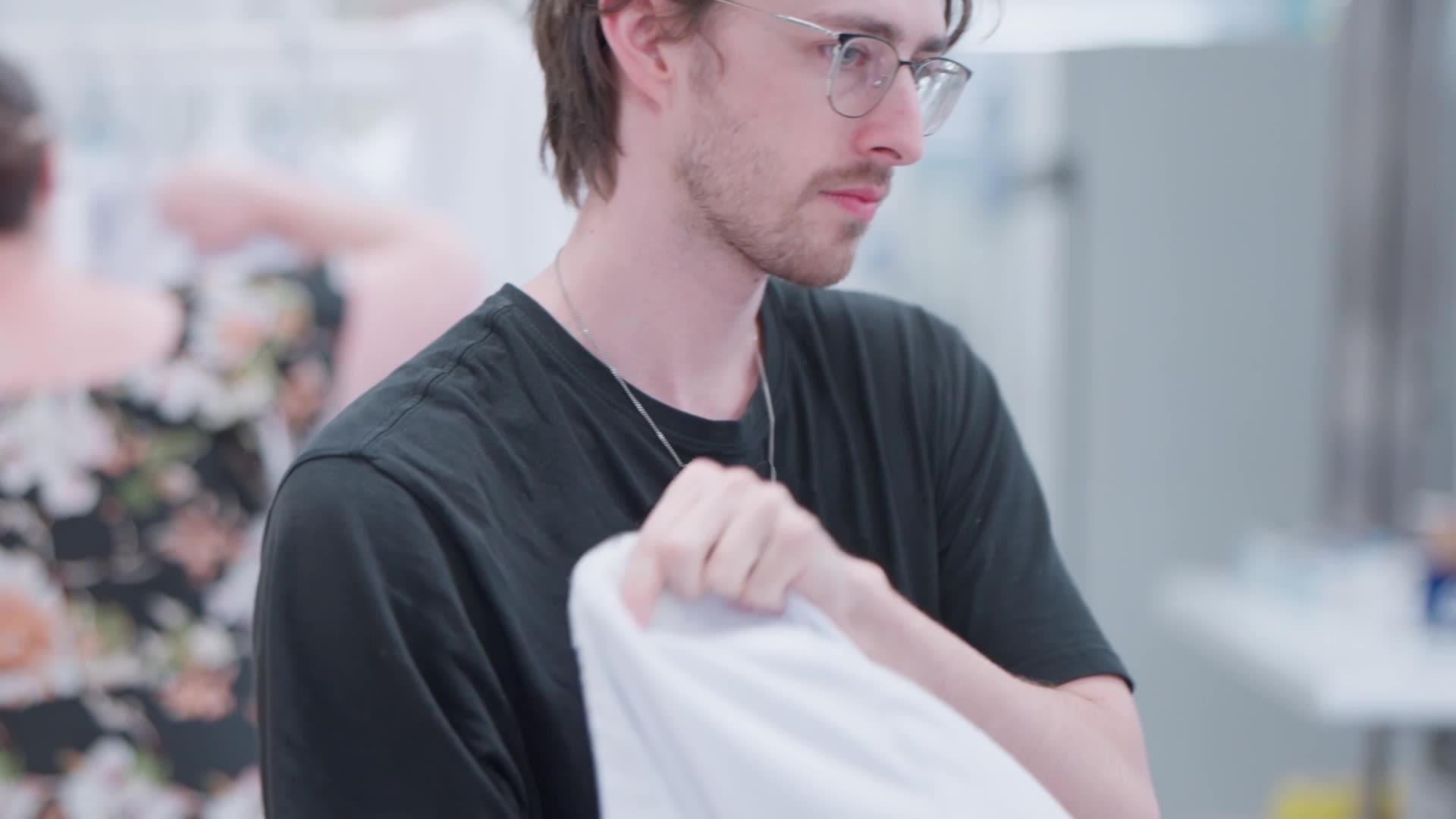
Two Murdoch PhD students have been able to commence their groundbreaking research projects thanks to support from the Alan and Iris Peacocke Research Scholarship.
Rhiannon Murphy is a full time PhD student working in Forensic Chemistry and Toxicology. She is passionate about ending violence against women and wants to contribute to this goal by investigating drug-facilitated sexual assault.
The drugs often implicated in this crime include alcohol, benzodiazepines (BSB) and GHB with all three having similar effects on a victim such as lowering inhibition, impairing responses and depressing the central nervous system. One of the challenges with prosecting these cases is alcohol and BSB are short lived within the body, and complicating it further, GHB is also present endogenously within the body at low levels which complicates the interpretation of toxicological results.
Exogenous sources of GHB (i.e. dosages given by the perpetrator) are readily metabolised within 12 hours, thus making the timing of reporting the crime and being examined critical. With GHB levels rapidly return to the physiological range, it is difficult to determine how much is generated within the body or comes from exogenous sources. Rhiannon’s research will interrogate the exogenous threshold, metabolism and analysis of GHB in toxicology. This will increase the investigating capabilities and provide victims with greater confidence to report.
Due to complete in 2028, Rhiannon aims for her research to be a key factor in addressing the enduring problem of sexual violence in the community, and the profound effects it has on survivors.
Aidan Murphy’s scholarship will support his research into developing an innovative therapy for Alzheimer’s disease (AD)- a physical brain disease with no cure. A 2022 study estimated that globally, there were about 32 million individuals with Alzheimer's dementia, 69 million with prodromal Alzheimer's, and 315 million with preclinical Alzheimer's. As global life expectancy rises and populations age, the number of people affected by Alzheimer's disease is projected to increase significantly in the coming decades.
AD is marked by amyloid plaques and neurofibrillary tangles, caused by a buildup of amyloid-β and tau proteins. Recently, the protein DYRK1A has been identified as a key factor in AD, as it helps regulate amyloid-β and tau accumulation. Research suggests that inhibiting DYRK1A can prevent or even clear these plaques and tangles, potentially reversing AD pathology.
Aidan’s research will focus on using antisense oligonucleotides (ASOs) to modify DYRK1A gene expression, exploring a potential treatment for AD. He is honoured to receive support from the Alan and Iris Peacock Research Foundation – philanthropic support he has seen have an impact in his area over many years.
“I’ve witnessed first-hand the benefits of the Peacock Foundation’s generous donations through my daily interactions with colleagues at the Institute of Immunology and Infectious Diseases. Collaborating closely with them, I have attained invaluable data crucial to my PhD project. This experience has deepened my gratitude for the late Alan and Iris’s support and commitment to advancing medical research,” said Aidan.
Alan Villiers Peacocke was a philanthropist who passed away aged 103 in 2015. His bequest of $3.5 million is the largest single bequest Murdoch University has ever received. In 1999, Mr Peacocke and the university established the Alan and Iris Peacocke Research Foundation to fund doctoral research scholarships in the areas of agriculture, horticulture and medical research.
Rhiannon Murphy
Rhiannon Murphy
Aidan Murphy
Aidan Murphy
Your generosity and support of Murdoch University is deeply appreciated. Through philanthropy, you are making a lasting difference to individual lives, and the global community. Your gifts, put simply, are powerful agents of change.
We look back on some of the outcomes from 2024 with pride. From the opening of a new state- of-the-art campus at Murdoch Singapore, to developing new initiatives which seek to ensure Aboriginal families and communities have access to culturally safe maternity care.
Of late, We have been particularly proud to see Murdoch University secure Telethon grants for five individual research programs - the maximum allowed in one year. These include research programs established to tackle some of the rare diseases that affect millions of children worldwide. These diseases have no cure, and often only supportive care and symptom management is available.
We also reflect on the nostalgia around 2024, as it was the year that saw the University celebrate its 50th anniversary since its inauguration. It’s evident that Murdoch can be immensely proud of its achievements over the last half century.
It has graduated more than 110,000 students. It has built a thriving veterinary school now ranked in the global top 50; and opened campuses locally in Mandurah and Rockingham, and internationally in Singapore and Dubai.
We continue to undertake world leading research through our phenome centre, and help solve critical issues for our State, our nation and the world ... including food security, environmental sustainability, and health care.
And while we always look forward, we never forget our founding principles, or our supportive partners such as yourself, whose vision and altruism is critical in helping the University with its mission to build a brighter future for all.
The broad stories shared in this report give just a taste of the power of philanthropy and a small window into some of the pioneering work you are making possible.
We are deeply grateful for your ongoing partnership with Murdoch University and the difference you continue to make.
Jo Nitz
Murdoch University
Director, Alumni and Philanthropy
